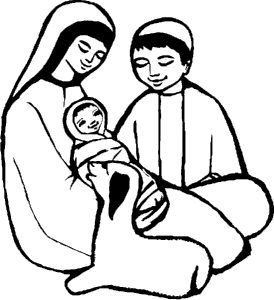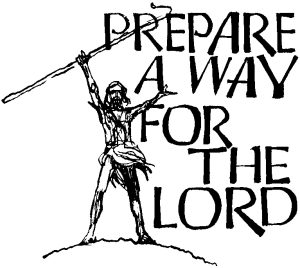Christmas Eve
Something I like to do to relax is to watch murder mysteries on television. Most of these are repeats now, and frequently when watching a repeat, I can tell you all about the peripheral characters in the episode, and what happens to them. Sometimes I can tell you who is about to be murdered – but it is very seldom that I can remember, until nearly the end who the murderer was, and yet surely that is the most important part.
We humans do like to measure things. When a new baby is born, the second thing we like to know about it is the birth weight – the first being whether it is a boy or girl. If you watch the news and weather forecast these days, it is seldom that we can hear it all without being told that what is being brought to us is the hottest or coldest or greatest or worst of its kind for over a year or decade, or sometimes even a century, be it temperature, windspeed or rainfall, or economic performance, price rises or measure of hardship. Life these days seems to be measured in percentages. The measurement of time too is something that humanity has created. Time does seem to pass by faster as you get older – when I was a child, the time between Christmas and my birthday in April seemed to last forever, but Christmases seem to arrive almost on top of each other nowadays!
God does not seem to worry about time in the way that we do – we believe that He is outside of measurable, linear time unlike us who see time measured from our birth to our deaths in a more or less straight line. And yet our measurement of time is based around the timing of God’s intervention into time, with the birth of Jesus. There has been a great deal of discussion as to when that actually took place, but I am not sure that knowing the exact day and year would help us in our faith at all, although if it turned out to have been in the summer, a great many of our much-loved Christmas carols would become obsolete. We do need to think about the timing though, as the time in the history of the nation was important. Israel was not at this time an independent state – there was a Roman army occupying the land, and tax collectors sending the wealth of the country to fill the coffers of a ruling power. But possibly worse than that, it had been about 400 years since any voice of prophecy from God had been heard. The people of Israel must have thought that their national life and deity had ended when they were carried into exile in Babylon, and they would not have been expecting Him to intervene in their national life after so long a silence. Often the hardest lesson to learn is that God breaks into our timeline at the point when the time is right – we cannot see the whole as He can.
To see the whole effect of the happening that we are celebrating today, that all the razzmatazz around us has been caused by, it is actually better to look at prophecies like the one we heard from Isaiah rather than the gospel accounts that we know so well. The story in Luke’s gospel is actually about Joseph and Mary; and were it not for the shepherds it could just be a story of a newly married couple trying to find a suitable place for the birth of their first child in a town that was massively overcrowded, possibly due to an administrative error, we will never know.
Isaiah, and the angels seen by the shepherds tell a different story however, and they give us some idea of the scale of God’s intervention into human history at this time. Isaiah seems to run out of ways to describe quite how dramatic this is – he describes sudden and almost blinding light in a place of utter darkness. He talks of the amazed joy that we might feel at a time of great good fortune, unexpected wealth – the modern equivalent might be a lottery jackpot. He tells of oppressed people suddenly being set free; their burden being ripped off enabling them to stand erect. And finally, he describes how all who suffer as a result of war will find peace and safety, and all the instruments of war will be utterly destroyed so that they cannot be used again. He finishes by pointing out that God will accomplish all this.
And what will happen to cause it all? A child will be born. It happens all the time – doesn’t it? But as he goes on, this is no ordinary child. Once again, Isaiah struggles to find the words to describe this child. Even the proudest of new parents is unlikely to go to these excesses. When I was thinking about this, the nearest illustration I could think of was that of a seed – and in particular a nut. If you have any nuts at home – and at Christmas lots of us do have – take a moment to consider an almond or a walnut. It is small enough for you to be able to hold several in your hand, and yet it contains the potential to become a large tree. But this comparison really does not hold water, as the seed – of whatever kind contains the potential to become something great, given the right conditions – elements absorbed from the soil, the sun and the rain – but this vulnerable baby contained not the potential to become, but already was the whole of the creator of our amazing universe.
Every Christmas we hear the wonderful passage read to us from the first chapter of John’s gospel. This used to be introduced at carol services with the phrase ‘St John unfolds the mystery of the incarnation’, and for many years I wanted to change that to ‘St John totally confuses the story of Christmas’. I see now that the problem is trying to explain to my very limited brain, something that is far greater than it will ever be able to comprehend. I think that is probably why we concentrate our thinking around the things that we can know and understand when we think about the incarnation.
We think about overcrowded inns, we invent a donkey, and some other livestock that may or may not have been present. We think about tiring journeys on foot, neglected sheep on a hillside and most of all a new-born baby that never cries. In the same way that I watch the murder stories, we concentrate on the things that we can understand. We have placed the importance on entertaining and feeding our families and the giving of gifts until they almost supplant the original story. None of these things are wrong – except perhaps for the never crying bit – but they are not the main event. I think that the reason we have reduced our thinking about the happenings of that first Christmas, is that the reality is far more than we can hope to fully understand. And so, I do wish you all a very peaceful and joyful Christmas – which begins with our worship this evening when we meet with God through the Eucharist. I hope that if you are spending time with friends and family, it will be a good time, and that if you will be alone at this time, that you will find a time of peace and rest.
I do hope as well that every one of us will be able to find the time on this Christmas Day, to step out of the lights and tinsel, and away from the eating and drinking, laughter and perhaps tears to spend a few moments alone with God. A time of quiet when we can immerse ourselves in His love, concentrate on His presence with us and His immeasurable gift to us and ask Him to help us to come a little closer to understanding what Christmas is actually all about.


